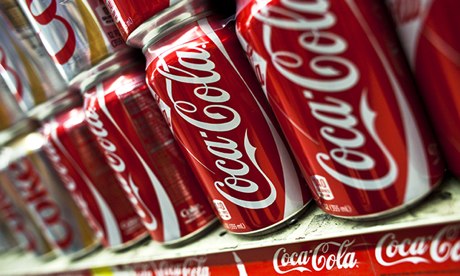Obesity experts campaign to cut sugar in food by up to 30%

Obesity experts are launching a campaign to put pressure on the government and industry to cut the sugar content of food and drinks by up to 30%. The high-profile scientists and doctors behind Action on Sugar say that gradual cuts in the amount of sugar in ready meals, cereals, sweets and soft drinks will not be noticed by the public, but will result in a reduction in the calories we all consume.
A 20-30% reduction in sugar over time will cut our calorie intake by about 100kcal a day – and more for those who consume a lot of sugar.
That is enough to halt or even reverse the obesity epidemic and reduce the toll of diabetes and other disease, say the doctors, who include Robert Lustig, author of Fat Chance: The Bitter Truth About Sugar, and Professors John Wass, academic vice-president of the Royal College of Physicians, Philip James of the International Association for the Study of Obesity and Sir Nicholas Wald of the Wolfson Institute of Preventive Medicine.
Action on Sugar aims to do what a similar campaign launched in the 1990s called Cash (Consensus Action on Salt and Health) successfully did for salt levels in our food. It is chaired by Professor Graham MacGregor, who also heads Cash.
"Provided the sugar reductions are done slowly, people won't notice," he said. "In most products in the supermarkets, the salt has come down by between 25% and 40%."
People had not noticed the difference. Kellogg's Cornflakes contain 60% less salt than they used to.
The government's strategy against obesity has been to agree voluntary curbs on marketing to children and calorie reduction through a public health "responsibility deal".
But MacGregor and others say it is not working and has had no effect on calorie intake. "We must start to slowly reduce the amount of calories people consume by slowly taking out added sugar from foods and soft drinks," he said.
The industry argues that sugars are forms of carbohydrate, which we need in our diet, and that we should cut calories by eating less, but there is no specific reason to target sugar.
"Sugars, or any other nutrient for that matter, consumed as part of a varied and balanced diet are not a cause of obesity, to which there is no simple or single solution," said the Food and Drink Federation. "That's why the food industry has been working on a range of initiatives with other players to tackle obesity and diet-related diseases."
The sugars in food and drinks are listed on the label, they said, so everybody can see what is in the products they buy. The industry has worked to reduce salt levels and saturated fats, but there is no evidence that sugars are particularly harmful, it said.
Aseem Malhotra, cardiologist and science director of the new group, disagrees, pointing to studies that suggest sugar increases the risk of diabetes, regardless of whether or not a person is overweight.
"Added sugar has no nutritional value and the body doesn't need any added sugar," he said. Claims by industry that sugar was needed for energy were untrue, he added.
The campaign is worried about hidden sugars in processed foods, such as the nine teaspoons in a standard 330ml can of Coke, the six teaspoons in a Muller Crunch Corner strawberry shortcake yoghurt, and the six in a 375g portion of Sharwood's sweet and sour chicken with rice. A serving of Kellogg's Frosties contains four teaspoons and Heinz classic tomato soup has four teaspoons in 300g.
Saturated fat contains more calories per gram than sugar, but Lustig, professor of paediatric endocrinology at the University of California, San Francisco, said that not all calories were the same.
"The science says that sugar is different – that sugar is dangerous exclusive of its calories, just like alcohol," he said. He called sugar "the alcohol of childhood", which was likely to put children at greater risk of fatty liver disease and diabetes.
Yoni Freedhoff, assistant professor of medicine at the University of Ottawa, Canada, another adviser to the group, said: "Not only has added sugar found its way into virtually everything we eat, but worse still, the use of sugar as a means to pacify, entertain and reward children has become normalised to the point that questioning our current sugary status quo often inspires anger and outrage."
Simon Capewell, professor of clinical epidemiology at Liverpool University, called sugar the new tobacco. "Everywhere, sugary drinks and junk foods are now pressed on unsuspecting parents and children by a cynical industry focused on profit not health," he said.
The Department of Health said: "Helping people eat fewer calories, including sugar, is a key part of the responsibility deal and our efforts to reduce obesity. There are 38 businesses signed up to reduce calories, but we want to go further still, and are discussing this with the food industry.
"As part of the responsibility deal calorie reduction pledge, Coca Cola has reduced calories in some of its soft drinks brands by at least 30%. Mars has reduced its single chocolate portions to no more than 250 calories, and Tesco has reduced the number of calories sold in its own brand soft drinks by over one billion."
| Reply via web post | Reply to sender | Reply to group | Start a New Topic | Messages in this topic (1) |
to Subscribe via email :
batavia-news-subscribe@yahoogroups.com
----------------------------------------
VISIT Batavia News Blog
http://batavia-news-networks.blogspot.com/
----------------------------
You could be Earning Instant Cash Deposits
in the Next 30 Minutes
No harm to try - Please Click
http://tinyurl.com/bimagroup
--------------
No comments:
Post a Comment